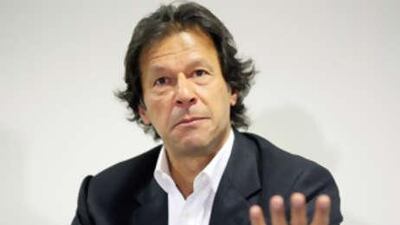ABU DHABI // Late on Sunday, the cricketer-turned-activist Imran Khan joined hundreds of volunteers and lorry drivers in Islamabad to pack their vehicles with supplies for those worst hit by Pakistan's devastating floods. Once the former Pakistani cricket captain and member of parliament had, along with his team, filled 150 lorries with donations of food and medicine, he climbed into a lorry and started an overnight journey to Peshawar, in northern Pakistan.
"There is a list of demands from the field," said Mr Khan. "They need medicines, but the immediate problem is that the people don't have anything to eat." The flooding of the Indus river, following torrential monsoon rains, has forced an estimated 20 million people from their homes this month. In the southern province of Sindh, flooding has ravaged 19 of the 23 districts, leaving about three million people homeless.
The floods have all but destroyed Pakistan's harvest, covering rich farmland that produces wheat and sugarcane. Officials estimate that at least eight million people now depend on aid for their survival. "One didn't have to travel far to witness the devastation caused by the rain water, or see the millions of people who have been displaced from their homes," said Mr Khan. One of his first deliveries was in Mianwali, his former constituency in Punjab province, where the Khans have an ancestral home. "It was obvious what the problem was," he said. "There is disease from stagnation of water, people have lost homes and the question is about how to get people mobilised."
Between now and Sunday, the convoy will visit various areas affected by the floods. The relief effort is part of Pukaar - the cry of the people - a campaign launched by Mr Khan to bring Pakistanis together to volunteer and donate to help the flood victims. He plans to visit the UAE next month to raise funds. Compared with the earthquake in 2005, which killed more than 75,000 people, the response to the floods had been slow, Mr Khan said.
"Now we have to mobilise the whole country. We want people to join in and we can do it. So far, the response has been phenomenal." The Pakistani government has reported 1,600 people dead and 2,366 injured, but millions remain at risk from disease and food shortages. "Even the most competent government would not be able to deal with this," said Mr Khan. "And not one that is corrupt. Where is the government at times of such a crisis?"
Although he did not name names, Mr Khan queried the decision by Asif Ali Zardari, the president, to travel to Paris and London earlier this month as the crisis unfolded. The success of the relief efforts would depend on how quickly aid reached the 20 million displaced Pakistanis, Mr Khan said. "With the help of the international community, we could recover," he said. "But we could see a serious setback to the growth rate of the country and issues of food security. The possibilities are grim."
@Email:sbhattacharya@thenational.ae

